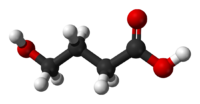GHB
GHB, also known as γ-Hydroxybutyric acid and 4-hydroxybutanoic acid, is a naturally occurring substance with depressant effects which is found in the human central nervous system, as well as in wine, beef, small citrus fruits, and in small amounts in almost all animals.[1]
GHB as the sodium salt, known as sodium oxybate (INN) or by the trade name Xyrem,[2] is used to treat cataplexy[3] and excessive daytime sleepiness in patients with narcolepsy. It has also been used in a medical setting as a general anesthetic, to treat conditions such as insomnia, clinical depression, narcolepsy, and alcoholism, and to improve athletic performance. It is also used as an intoxicant (illegally in many jurisdictions) or as a date rape drug.[4]
GHB is naturally produced in the human body's cells. As a supplement or drug, it is used most commonly in the form of a salt. GHB is also produced as a result of fermentation, and so is found in small quantities in some beers and wines. Succinic semialdehyde dehydrogenase deficiency is a disease that causes GHB to accumulate in the blood.
Chemistry
Pharmacology
Subjective effects
Physical effects
Cognitive effects
Toxicity and harm potential
Tolerance and addiction potential
Interactions
Legal issues
See also
References
- ↑ Weil, Andrew; Winifred Rosen (1993). "Depressants". From Chocolate to Morphine (2nd ed.). Boston/New York: Houghton Mifflin Company. p. 77. ISBN 0-395-66079-3.
- ↑ http://www.reuters.com/finance/stocks/companyProfile?rpc=66&symbol=JAZZ.O
- ↑ Sodium Oxybate | http://www.nlm.nih.gov/medlineplus/druginfo/meds/a605032.html
- ↑ GHB, GBL and 1,4BD as Date Rape Drugs | http://web.archive.org/web/20120510151441/http://www.justice.gov/dea//ongoing/daterapep.html

